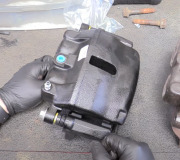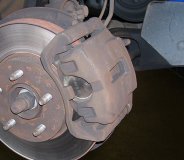From everything you described, your mechanic is exactly right, and while it can be hard to understand, you have "unreasonable expectations". This would be like going in for a really in-depth physical, then you are angry with your doctor because they did not see that you had a kidney stone forming. (Believe me, you never want a kidney stone!). You never had one before, your doctor has no reason to charge for tests to look for something that is not expected to be found, but you are angry when you are in extreme pain a month later from, of all things, a kidney stone. If that stone never developed, you would hold it against your doctor for the rest of your life for wasting your money on a worthless test. Instead, he should be concentrating on the symptoms you tell him about.
In the case of your brakes, there were symptoms or observations leading up to the failure, but if you had not noticed them yet, why would you expect the mechanic to tear everything apart to look for something that is not expected to be found? We hear comments all the time about trying to sell people parts and services that are not needed. Well, now you have a situation where no one tried to sell you something that was not known to be needed. If he had disassembled one of the brakes, the rusted hardware would probably have crumbled in his hands, then he would have to tell you things were needed that you were not expecting. That is exactly what we get blamed for all the time and this is why we try to avoid this type of problem.
Also, this type of parts failure is very common, but the brake hardware can look rusty and still be perfectly fine to remain in service.
The most telling part of your description was:
"He tells me that the sliders in the carrier had 'rotted' and caused the calipers to seize, this wore down the brake pads because it was holding onto the disks, and this damaged the disks and calipers irreparably. So they need to be replaced".
The first problem is I understand what he is describing, but for the average car owner, a lot has been lost in translation. It is obvious to me that he is taking what he found and describing it in such a way that you will understand. That is part of his job, but another mechanic could pick that apart and make it sound like you are being mislead or the mechanic is incompetent.
This wear does not occur in a day or two. If a brake is not applying or not releasing properly, you will notice a pull to one side, dragging with difficult acceleration, a hot wheel after a short drive, or very commonly, a hard pulsing in the steering wheel. If a pad is worn down to the metal backing plate, you will easily hear the grinding noise. If that is addressed within a few days, we used to be able to save the rotor, but you would not believe how many people say they heard that noise over a month ago and just kept on driving.
To ease the misery a little, there is always a published legal minimum thickness a brake rotor can be allowed to wear down to before the mechanic is required to replace it. Twenty or thirty years ago, when cars were bigger and heavier, a rotor with grooves worn into it could be machined two or three times and be put back on the car. Today, to save weight and improve fuel mileage, there is very little extra metal on rotors. Often they wear normally to the point of having to be replaced legally even when there was no catastrophic failure and the pads are not totally worn out yet. The good news is rotors today are horribly inexpensive for most cars. In the 1980's, a replacement rotor could cost around $80.00 to $100.00. Today a typical rotor can cost less than $20.00. (Sorry I do not know how that translates to pounds). When we factor in the amount of time it takes to measure a rotor, determine if it will still be legal after it is machined, consider the cost of cutting bits and other consumables for the brake lathe, and the time it takes to do that machine work, it costs a shop more to try to save your old rotors than to just replace them. You end up with new rotors as thick as the originals were, a better brake job, and at lower cost, so do not fret over the need for new rotors. Consider new rotors as saving you money.
The bottom line is you are describing a problem that is not uncommon, has a common solution, may have been aggravated by you not noticing noises or some other symptoms, and there was no evidence at the time that the mechanic should have suspected this problem was developing or he should have looked into it further. My concern at this point is the cost. Again, I am not familiar with pounds, but if this was $800.00, that would be way too much. A standard brake job on many cars can cost less than $200.00 including a pair of new rotors. When calipers are needed, it is is always advisable to replace both at the same time. That will insure balanced braking, and whatever went wrong with one caliper, the other one is just as old and was driven through just as much water, so it can be expected to develop the same problem. The more expensive rebuilt calipers here in the U.S. Cost around $50.00. Many cost less than $25.00 each. Add another half hour labor to bleed the air out of the system, and you are still looking at less than $300.00 to $400.00 for the entire job.
I can offer two possible suggestions. The first is to get a second opinion from a different shop. Be very careful to compare the same service at both places. The first shop should have given you a written estimate listing the exact parts and the labor cost for the entire job. If it just say something like, "Fix defective brakes... ", that gives you nothing to compare. At the second shop, ask what they would charge for, ... Then you recite the list of parts and services. Do not name the first shop. If the people at both shops are friends, the second one might give you a higher estimate to make their friends look good. If they are bitter enemies, the second shop will give you a much lower estimate so they look good, but then they will "find" additional things that are needed once they have your car torn apart. If the people at the second shop do not know who gave you the first estimate, they will have no choice but to be more fair. Be aware they are giving you an estimate based on your list that you were given. If the first shop overlooked something, you cannot fault the second shop when they find it and have to charge you for it. To be really fair and objective, the people at the second shop will want to do their own inspection and analysis before developing their own estimate for repairs.
Here in the U.S. Most independent repair shops use a large book called a "flat rate guide" when they bill out labor charges. Those books list every procedure on every model of car, with the number of hours and tenths of an hour the job should take. That way every shop charges the same amount of time, and the only variable is their hourly rate. An experienced mechanic who has invested in lots of expensive specialty tools and advanced training will get the job done faster than the flat rate time so he can move on to the next job sooner, but you pay the same amount. An inexperienced mechanic will probably take longer than the flat rate time, but you do not get charged more. That mechanic loses money on each job until he learns to work more efficiently and he gains experience.
The second great and wondrous suggestion I can offer is to look for a nearby community college with an Automotive program and see if they would be willing to look at your car. We were always looking for live work to give our kids real-world experience, and we had about two dozen community members who would sit on a broken car for months until it fit what we were teaching because they knew the value it had for us. The students are well-supervised and are very respectful. We got parts at very good discounts, then marked them up ten percent to form a "breakage" fund in case we damaged something that was our fault. Labor was billed at ten dollars per hour for what the job was supposed to take according to the flat rate manual, but be aware, the kids are only in the shop a few hours per day, so it could take a week or two to get your car back. Also, we only did brake work the one time per year when that class was being taught. To do brake work when we were teaching Electrical, for example, would take learning time away from electrical stuff, and it would take work away from the local employers who hire our graduates. If timing and the school's need for certain types of learning experiences comes together, this can be a way to get repairs done for a very low cost, but at a trade-off for speed.
Wednesday, April 25th, 2018 AT 3:18 PM



